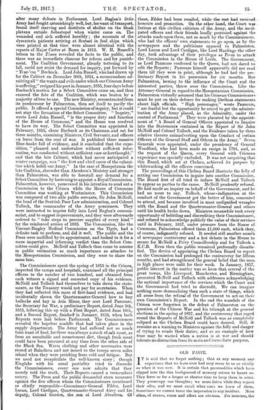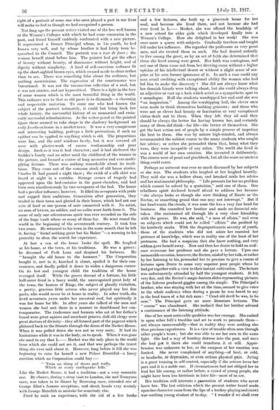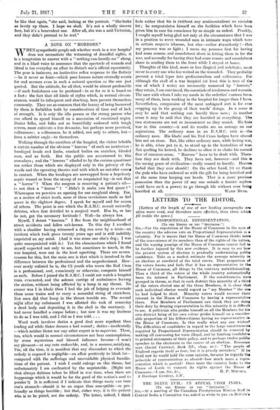OLD PASTE.
1T is said that we forget nothing ; that at any raomeut say experience that we have ever hud may recur to us as vividly as when it was new. It is certain that personalities which have slipped into the dim background of memory return to haunt us. They force us for a longer or shorter time to keep them is mind.. They rreomupy our thoughts; we must listen while they repeat their roles, and we must recall what ones we knew of them. Sometimes we cannot trace the impression to any incident. More often, of course, cause and effect are obvious. For instance, the
sight of a portrait of some one who once played a part in our lives will make us feel as though we had recognized a person.
Not long ago the present writer visited one of the less well known of the Women's Colleges with which he had some connexion in the past, and found himself suddenly confronted with a new picture. It represented a fOrmer Principal whom, in his youth, he had known very well, and by whose brother it had lately been be- queathed to the Council. The portrait was a tour de force ; tho woman herself stood before him. The painter had got the effect of beauty without beauty, of dominance without height, and of dignity without simplicity. A kind of self-eonacious radiance lit up the short-sighted brown eyes, which ecemed made to shine rather than to see. There was something false about the radiance, but nothing meretricious. The expression of the countenance was intentional. It was not the unconscious reflection of a soul, but it was not sinister, and not hypocritical. There is a light in the face of some women which is the moat beautiful thing in the world. This radiance was to that as old paste is to diamonds—a charming and respectable imitation. To some one who bad known the subject of the portrait intimately, it could but bring back her whole history, the uneventful history of an unmarried and emin- ently successful schoolmistress. As the writer gazed at the painted figure there seemed to take shape in the shadowy background an early Jacobean house in a market town. It was a very conspicuous and interesting building, perhaps a little pretentious, if such an epithet can be applied to anything which is old. The proportions were fine, and the oriel windows lovely, but it was covered all over with plaster-work of coarse workmanship and poor design. Such as it was it had character; and it had sheltered the builder's family and no other until the childhood of the woman in the picture, and formed a centre of long memories and ever-multi- plying fictions. There was nothing remarkable about its tradi- tions. They came out of the common stock of old house stories. Charles II. had passed a night there ; the swish of a silk skirt was heard at night in a corridor. Strange scenes of tragedy had appeared upon the bed-curtains in the guest-chamber, and had been seen simultaneously by two occupants of the bed. The house had a peculiar influence, however. It filled its occupants with pride and sapped their ambitions. Generation after generation, they traded in their town and gloried in their house, which had not one acre of land or oneeperson of note connected with it. No artist, no man of letters, no soldier, and no sailor went forth from it. The name of only one adventurous spirit was ever recorded on the side of the huge vault where so many of them lay. He went round the world in the beginning of the seventeenth century. It took him two years. He returned to his town in the same month that he left it, having " found nothing great but his Maker "—a warning to his posterity to shun the search for experience.
At last a son of the house broke the spell. He laughed
at his home, at the town, at his traditions. He was a grocer : he dreamed of Park Lane and despised his forbears. He " brought the old house to the hammer." The Corporation bought it, met in it, knocked it about, spoiled it for their con- venience, and finally pulled it down to widen a dangerous corner. On its last and youngest child the tradition of the house revenged itself. While the grocer dreamt of a fortune, his little half-sister lived in a fancy world, the unrecognized great lady of the town, the hostess of Kings, the subject of ghostly visitation, a pretty, gracious little actress who never played any but fine parts, who would never be at home in reality. In sober truth, she lived seventeen years under her ancestral roof, but spiritually it was her home for life. In after years she talked of the men and -women she had met there in a manner to dumbfound her con- temporaries. The tradesmen and farmers who sat. at her father's board were great squires and merchant princes, dull old clergy were great doctors of divinity—they all formed part of the pageant which glittered back to the Stuarts through the doors of the Market Howse. When it was pulled down she was not so very sorry. It had its limitations while it was in the body, so to speak. When it was gone she-used to say that L— Market was the only place in the world from which she could not see it, and that was perhaps the truest thing she ever said about it. However, long before it fell she was beginning to raise for herself a new Palace Beautiful—a fancy erection which no Corporation could buy :—
"'Twos no thing of doom and walls, 'Which at every earthquake falls."
Like the Market House, it had a tradition—not a very romantic One. By chance, during a stray visit to London, she met Tennyson once, was taken in to dinner by Browning once, attended one of George Eliot's famous receptions, and shook hands very warmly with George Meredith in mistake for somebody else.
Fired by such an experience, with the aid of a few books
and a few lectures, she built up a gimcrack home for her soul, and because she lived there, and not because she had ever lived in L— Market, she was offered the headship of a new school for elder girls which developed finally into a Women's College. How she delighted in her work! She was once more 6 queen with subjects. Gradually teachers and taught fell under her influence. She regarded the professors as very great men, and she treated them as such. She had desired ardently to live among the great, so by an act of faith she determined that those she lived among were great. Her faith was contagious, and not one of them came out from her drawing-room without a higher opinion of his intellectual desert or without a slight sense of sur- prise at bin own former ignorance of it. In such a ease could any man avoid crediting with exceptional ability the woman who had led him to snake the discovery ? She did not always know what her donnish friends were talking about, but she could always drop an adjective or cast up a look which acted as a sympathetic spur to a monologue. Half the students worshipped her and said she was "an inspiration." Among the worshipping half, the clever ones were made to think themselves budding geniuses ; and those who were not so clever had beauty or fascination or very exceptional virtue dealt out to them. When they left they all said they should be always the better for having known her, and certainly many of them did think—for life—the better of themselves. She got the best action out of people by a simple process of imputing the best to them. She was by nature high-minded, and always recommended the noblest course to the many students who sought her advice; or rather she persuaded them that, being what they were, they were incapable of any other. The world she lived in was a world of her own creation. She invented it deliberately. The streets were of pearl and pinchbeck, but all the same no unclean thing could cutter.
Perhaps no autocrat was ever no much discussed by her subjects as she was. The students who laughed at her laughed heartily. They said she was a hollow sham, and brushed aside her advice and her sentimental philosophy. " Life presents for her no problem which cannot be solved by a quotation," said one of them. One rebellious spirit declared herself afraid to address her because " she always looks as though she were thinking of Dante or the Rector, or something grand that one may not interrupt." But if her head wasin the clouds, it was none the less a very line head for business. She consulted her brother and made no financial min. takes. She maintained all through life a very close friendship with the grocer. He was, she said, " a man of affairs," and even on subjects which could not be called affairs " she profited by his brotherly snubs. With the disproportionate severity of youth, those of the students who did not adore her resented het pretence of knowledge, which was in reality one of the least of her pretences. She had a suspicion that she knew nothing, and very seldom gave herself away. Now and then her desire to hold an audi- ence overcame her prudence and she gave a lecture. Upon one memorable occasion, however, the Rector, misled by her talk, or rather by her listening to his, persuaded her to promise to give a course of lectures upon Dante to some very superior poor people whom ho had got together with a view to their instant cultivation. The lecture was unfortunately attended by half the youngest students. It fell very flat, and the Rector's magic-lantern slides representing pictures of the Inferno produced giggles among the simple. The Principal's brother, who was staying with her at the time, seemed to give voice to the whole audience when during a pause he was hoard to say in the loud tones of a fat rich man " Cruel old devil he was, to be sure." The Principal gave no more literature lectures. The "course" was abandoned. She realized that her brother advised a continuance of the listening attitude.
One of her most noticeable qualities was her courage. She rushed in upon other folk's troubles and set to work to persuade them— not always unsuccessfully—that in reality they were nothing else than precious experiences. It is a view of trouble often seen through other people's tears ; but she was able to see her own in the same light. She had a way of hunting distress into the past, and ones she had got it there she could transform it at will. Appre; hension was unknown to her, so the compass of her emotion was limited. She never complained of anything—of heat, or cold, or headache, or depression, or even serious physical pain. Acting is a great training in self-control, especially if the actress loves her part and it is a noble one. If circumstances had not obliged her to lead her life among, or rather before, a crowd of young people, abs might have been less histrionic in later life—moat of us are.
Her tradition still interests a generation of students who never knew her. The last criticism which the present writer heard made_ upon her character came from the lips of a hockey-playing and (now) war-working young student of to-day. • " I wonder if we shall ever
be like that again, "she said, looking at the portrait. "She looks so lovely up there. I hope we shall. It's not a wholly sincere face, but it's a benevolent one. After all, she was a mid-Victorian, and they didn't pretend to be reaL"




























 Previous page
Previous page